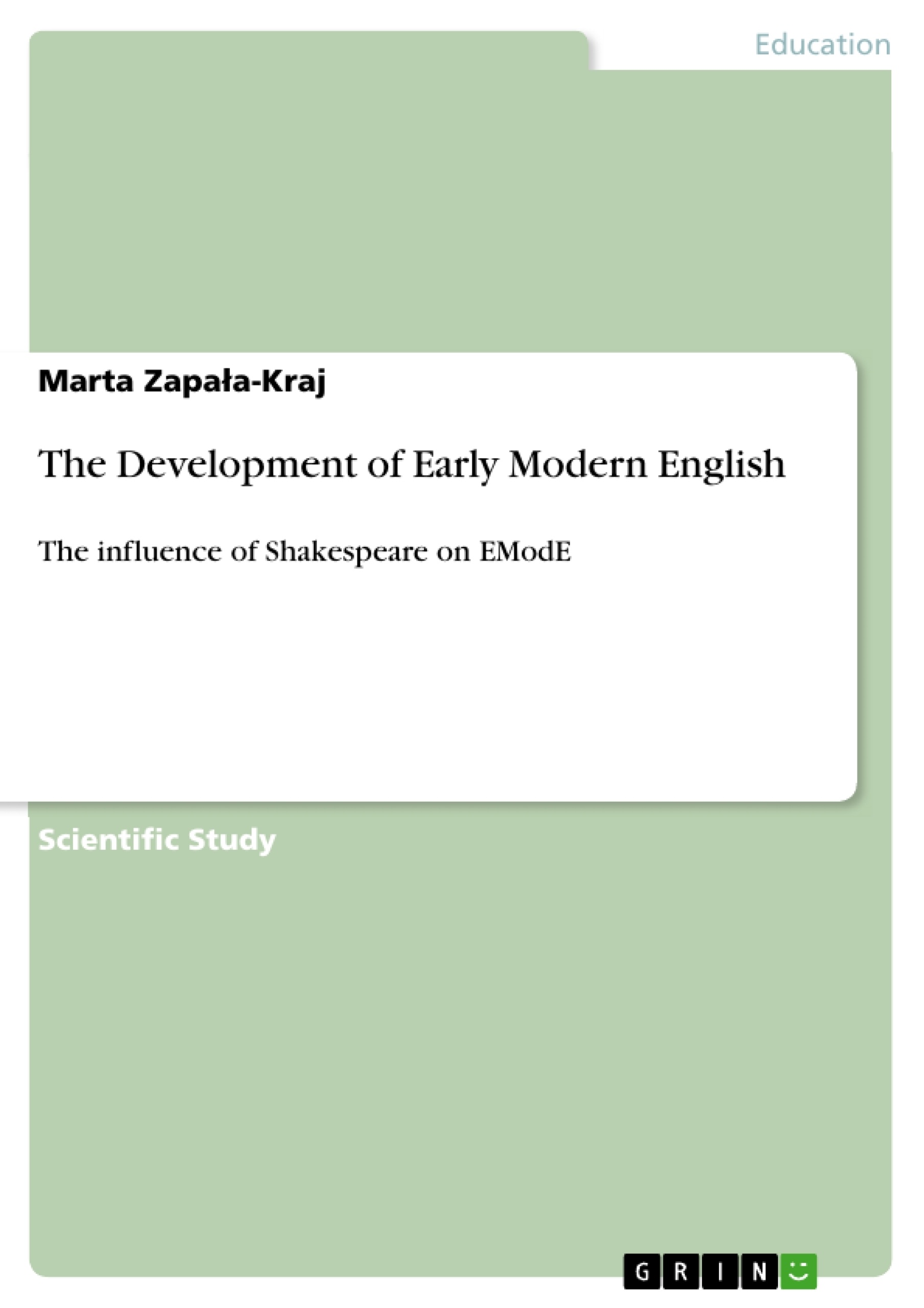
The Development of Early Modern English
Wissenschaftliche Studie, 2009
57 Seiten
Didaktik für das Fach Englisch - Literaturgeschichte, Epochen
Leseprobe
Table of Contents
- Chapter One: Historical Background of Early Modern English
Objectives and Key Themes
The main objective of this work is to present a comprehensive overview of Early Modern English (EME), tracing its evolution from 1476 to the early 18th century. It aims to explore the diverse factors influencing this development, encompassing external influences and internal linguistic changes.
- The historical context of EME's development.
- External factors influencing the evolution of EME (e.g., the printing press, social changes).
- The linguistic innovations of William Shakespeare.
- Internal changes within the English language during the EME period (e.g., The Great Vowel Shift).
- The impact of social and political events on the English language.
Chapter Summaries
Chapter One: Historical Background of Early Modern English: This chapter lays the groundwork for understanding the complexities of Early Modern English. It emphasizes the interconnected nature of linguistic elements, highlighting how any given change is the product of various interacting levels of language and the sociohistorical context. The chapter posits that language is a crucial tool for communication and self-expression, shaping individual and societal identities. It argues that language is both shaped by and a shaper of society, demonstrating its fundamental role in human culture and development. Examples provided include the difficulties in pronouncing sounds of unfamiliar foreign languages, emphasizing the importance of shared linguistic rules for communication. The chapter also touches upon the vast global reach of English today and its many variations, while noting the ongoing evolution of the language.
Keywords
Early Modern English, language evolution, historical linguistics, sociolinguistics, William Shakespeare, The Great Vowel Shift, linguistic change, social factors, political factors, language standardization.
Frequently Asked Questions: A Comprehensive Language Preview of Early Modern English
What is the main objective of this work?
The main objective is to provide a thorough overview of Early Modern English (EME) from 1476 to the early 18th century, examining the various internal and external factors that shaped its development.
What key themes are explored in this preview?
Key themes include the historical context of EME's development, external influences like the printing press and social changes, linguistic innovations of William Shakespeare, internal changes such as The Great Vowel Shift, and the impact of social and political events on the English language.
What is covered in Chapter One: Historical Background of Early Modern English?
Chapter One establishes the foundation for understanding EME's complexities. It emphasizes the interconnectedness of linguistic elements, highlighting how changes result from interactions between different language levels and sociohistorical context. It explores language as a tool for communication and identity formation, showing its role in shaping and being shaped by society. The chapter also touches upon the global reach of English and its ongoing evolution.
What are the key words associated with this work?
Key words include Early Modern English, language evolution, historical linguistics, sociolinguistics, William Shakespeare, The Great Vowel Shift, linguistic change, social factors, political factors, and language standardization.
What types of information are included in this language preview?
This preview offers a comprehensive overview including the title, table of contents, objectives and key themes, chapter summaries, and keywords.
What is the time period covered by this study of Early Modern English?
The study covers the period from 1476 to the early 18th century.
Details
- Titel
- The Development of Early Modern English
- Untertitel
- The influence of Shakespeare on EModE
- Veranstaltung
- -
- Autor
- MA Marta Zapała-Kraj (Autor:in)
- Erscheinungsjahr
- 2009
- Seiten
- 57
- Katalognummer
- V161311
- ISBN (eBook)
- 9783640754236
- ISBN (Buch)
- 9783640754564
- Dateigröße
- 697 KB
- Sprache
- Englisch
- Anmerkungen
- The paper is supposed to present what was the way the English language went through to become what it is now, however, with the focus on Early Modern English. Also, it deals with William Shakespeare, trying to show how much was his influence in the language development.
- Schlagworte
- Early Modern English Shakespeare Great Vowel Shift English grammar history of language biography analysis of language aspects printing press growth of population
- Produktsicherheit
- GRIN Publishing GmbH
- Preis (Ebook)
- US$ 20,99
- Preis (Book)
- US$ 30,99
- Arbeit zitieren
- MA Marta Zapała-Kraj (Autor:in), 2009, The Development of Early Modern English, München, Page::Imprint:: GRINVerlagOHG, https://www.diplomarbeiten24.de/document/161311
- Autor werden
- Ihre Optionen
- Vertriebskanäle
- Premium Services
- Autorenprofil
- Textarten und Formate
- Services für Verlage, Hochschulen, Unternehmen

- © GRIN Publishing GmbH.
- Alle Inhalte urheberrechtlich geschützt. Kopieren und verbreiten untersagt.
- info@grin.com
- AGB
- Open Publishing
Der GRIN Verlag hat sich seit 1998 auf die Veröffentlichung akademischer eBooks und Bücher spezialisiert. Der GRIN Verlag steht damit als erstes Unternehmen für User Generated Quality Content. Die Verlagsseiten GRIN.com, Hausarbeiten.de und Diplomarbeiten24 bieten für Hochschullehrer, Absolventen und Studenten die ideale Plattform, wissenschaftliche Texte wie Hausarbeiten, Referate, Bachelorarbeiten, Masterarbeiten, Diplomarbeiten, Dissertationen und wissenschaftliche Aufsätze einem breiten Publikum zu präsentieren.
Kostenfreie Veröffentlichung: Hausarbeit, Bachelorarbeit, Diplomarbeit, Dissertation, Masterarbeit, Interpretation oder Referat jetzt veröffentlichen!
- GRIN Verlag GmbH
-
- Nymphenburger Str. 86
- 80636
- Munich, Deutschland
- +49 89-550559-0
- +49 89-550559-10
- info@grin.com
-









